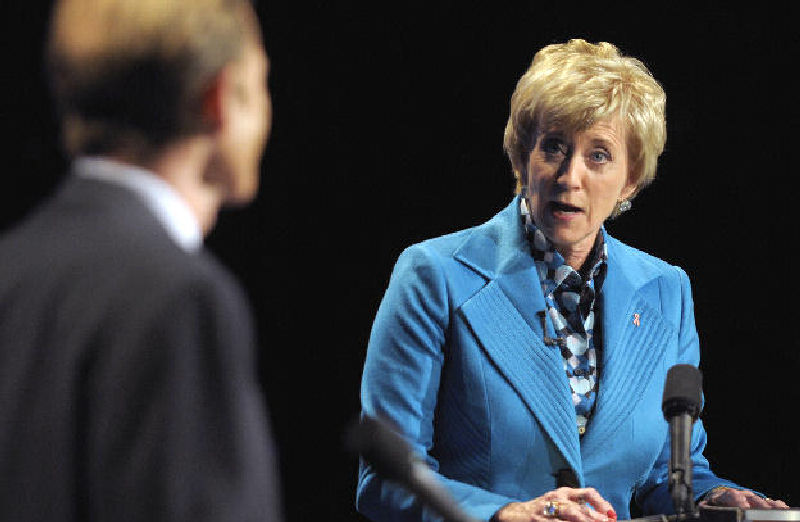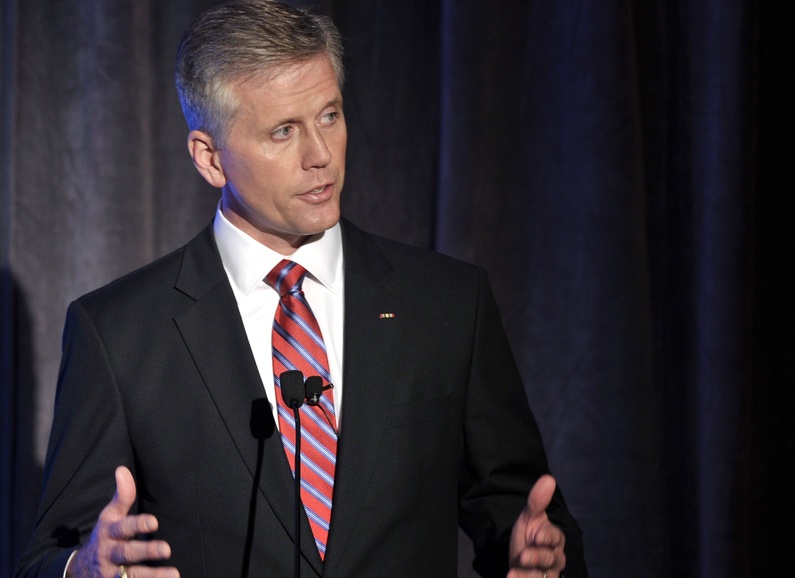PROVIDENCE, R.I. – Tuesday’s elections could not have gone much worse for Republicans in New England.
Republican presidential candidate Mitt Romney, a former Massachusetts governor, did not capture a single electoral vote in the region.
Sen. Scott Brown, who electrified Republicans with his upset victory in a special election in January 2010 to succeed the late Sen. Edward Kennedy, was cast aside by Massachusetts voters in favor of Democrat Elizabeth Warren.
Elsewhere in New England, Republicans lost every major election for Congress and governor. The six-state region will not have a single Republican U.S. House member, and only two Republican senators will serve in the next session. Only one of the six governors will be Republican.
The losses disheartened Republicans, who have been fighting dwindling numbers here for years.
“It’s a nightmare,” said former Republican U.S. Rep. Chris Shays of Connecticut, a day after the election.
Rob Coupe, political director for Rhode Island Republican congressional candidate Brendan Doherty, seen as the party’s best shot in two decades to pick up a House seat representing the state, struggled when asked to explain his candidate’s defeat. Doherty finished a stunning 12 percentage points behind freshman Democratic Rep. David Cicilline.
“I think it’s just tough to be Republican in Rhode Island,” Coupe said. “I don’t know what else to say.”
Massachusetts has produced Democratic icons like the Kennedys and the late House Speaker Tip O’Neill, and the region is known for liberal stances on issues such as gay marriage, which is now legal in all New England states except Rhode Island.
But the area once had a number of “rock-ribbed” Republicans who stood for fiscal conservatism, environmental stewardship and protection of personal liberties, including support of abortion rights. As the national party has moved farther right and focused on social issues, it has turned off voters and candidates alike.
Lincoln Chafee, whose father, the late Sen. John Chafee, defined the Republican brand in Rhode Island for decades, lost his Senate seat in 2006 and became an independent in 2007. He spoke at the Democratic National Convention to support Obama this year.
Maine still has a Republican governor, tea party-backed Paul LePage, and Connecticut, Rhode Island and Vermont had Republican governors who left office in January 2011. But the overall trend has been Republicans losing ground, even in New Hampshire and Maine, once strongholds for the party.
In New Hampshire, the “live free or die” state that has long prided itself on low taxes and small government, Republicans lost both U.S. House seats, as well as control of the state House of Representatives, although they retained narrow control in the state Senate. Maggie Hassan, a Democrat, won the governor’s office.
Maine still has a Republican U.S. senator, Susan Collins. But Democrats on Tuesday won both chambers of the Legislature, and independent former Gov. Angus King won the U.S. Senate seat being vacated by centrist Republican Olympia Snowe.
The only other Republican who represents the region in Washington is Sen. Kelly Ayotte of New Hampshire. Vermont’s senators are a Democrat and an independent, Bernie Sanders, who calls himself a democratic socialist and caucuses with Democrats.
Shays, a moderate who lost his congressional seat to a Democrat four years ago, ran for Senate this year and lost in the primary to Republican Linda McMahon, who lost to Democratic Rep. Chris Murphy.
“My party is out of touch, and the brand is not a good brand,” Shays said, ticking off a list of problems, including Senate candidates in Missouri and Indiana who made comments about rape that many voters here found offensive. The national party can’t cater just to voters from places like Oklahoma, he said.
“We’re New England Yankees, and we think a little differently,” Shays said. “The people we represent focus more not on ideology, but on common sense.”
While much of the region has voted heavily Democratic in recent years, voter registration numbers show a more nuanced picture.
Voters unaffiliated with any party outnumber Democrats and Republicans in all the New England states that collect that information, representing 40 to nearly 53 percent of the electorate, depending on the state.
Registered Democrats outnumber registered Republicans everywhere but New Hampshire. Only Vermont doesn’t track such information.
To appeal to independents in Massachusetts, Brown positioned himself as a moderate, pro-abortion rights Republican and one of the most bipartisan members of the Senate. He ran TV ads that pictured himself with Obama, while barely uttering Romney’s name. It didn’t work. He lost by 8 points to Warren.
“They were able to label him and convince enough voters that he would be the 51st vote in the Senate to reverse successes that women had made over the years,” said Gene Hartigan, a Republican consultant and former state party director.
Rhode Island congressional candidate Doherty argued that the state would be better served by having a Republican in the House, and said he could exert his influence to moderate the national party’s positions.
Voter Lisa Harden of East Providence, R.I., didn’t buy it.
“He’s a Republican, and he’s going to follow the other Republicans,” she said Tuesday after voting for the Democrat.
Darrell West, director of governance studies at the Brookings Institution, said the national party has no incentive to care about New England because population has shifted to the South and West, and that’s where the party sees its future.
New England’s Republicans are “going to have to get used to it, because it’s hard to see this changing anytime soon,” West said.
But some in the party took a more optimistic view.
“The major problems of the day, our crushing debt and bad economy, were not fixed by this election, and these problems will re-emerge bigger than ever,” said Jerry Labriola Jr., chairman of the Connecticut Republicans. “It’s inevitable that the voters will need to turn to pro-growth, common-sense solutions offered by Republicans.”Staff File Photo/Gordon Chibroski
Republican presidential candidate Mitt Romney holds a town hall meeting at Portland Yacht Services in February. Romney, a former Massachusetts governor, did not capture a single electoral vote in New England on Tuesday.
Send questions/comments to the editors.




Success. Please wait for the page to reload. If the page does not reload within 5 seconds, please refresh the page.
Enter your email and password to access comments.
Hi, to comment on stories you must . This profile is in addition to your subscription and website login.
Already have a commenting profile? .
Invalid username/password.
Please check your email to confirm and complete your registration.
Only subscribers are eligible to post comments. Please subscribe or login first for digital access. Here’s why.
Use the form below to reset your password. When you've submitted your account email, we will send an email with a reset code.